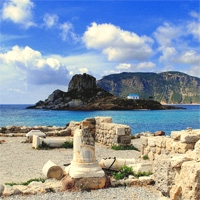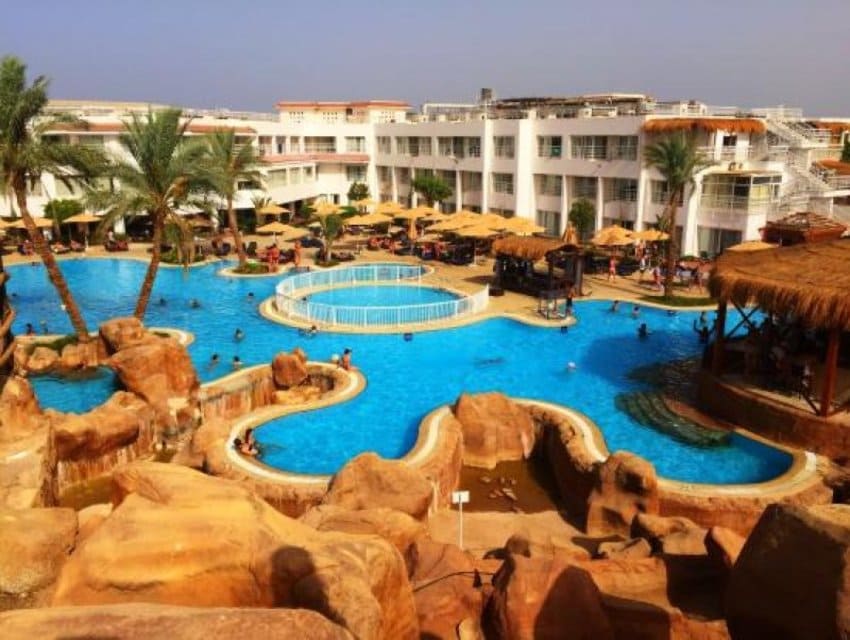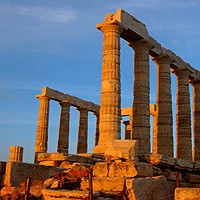Kos Island: in the palms of Aphrodite
 I walk along the quay of Kos, from the marina, where pretty yachts barely sway on the leash of the yacht, and under their sick sisters, stretched to the land with winches and put on slipways, tanned sailors tinker. I am going to the fortress itself, where a tourist train crawls under the arched bridge with passengers hooting with delight.
I walk along the quay of Kos, from the marina, where pretty yachts barely sway on the leash of the yacht, and under their sick sisters, stretched to the land with winches and put on slipways, tanned sailors tinker. I am going to the fortress itself, where a tourist train crawls under the arched bridge with passengers hooting with delight.
At the very end of the pier, outstanding far into the sea, sits a young couple. They do not pay any attention to the waves, occasionally sweeping over the concrete platform of the pier. They do not pay attention to me, nor to the same as I am lounging citizens with cameras and video cameras. They are whispering about something, and looking at the horizon, they are smiling at something that only two of them understand. And in another gust of wind, when my ankle feet are in the water, I notice that the place where the young people are so nicely located is not reached by the waves. Their small cozy world, created on a tiny corner of the pier of love, sun, air and sea, is not subject to the laws of nature: neither the onslaught of waves and wind, nor the onslaught of time. He seems to be lying in the palms of Aphrodite, who is looking at this idyll with curiosity, listening with interest to the unhurried conversation of lovers and hiding them from the intervention of unkind forces.
I think for a moment: everything that I was told about Kosa, urging me not to waste time on this empty island, is now perceived by me as complete nonsense. “It’s not interesting there, there’s nothing to watch, there’s no place to go, and it becomes boring the next day” – if you are serious about such nonsense, then you shouldn’t spend time on travel, except, perhaps, from falling free from a helicopter to the crater active volcano – concise and impressive.
After all, in fact, everything is so simple – you want to be happy, be it. I thought about it only twice: on the pier, when I looked at the lovers with wet feet, and later – lying at night in the natural bowl of the thermal pool on the seashore, looking at the sky full of stars.
But I didn’t think about it either when the hefty youngsters in white packs flew next to me with acrobatic jumps on the Greek evening, nor when the gray stallion pressed on the arena with a warm face to my cheek, nor when we drove around a small island at Kefalos in search of fish, and our captain, so that he was not disappointed by his lack of it, jumped into the water and clung to the glass under water. And, of course, I was far from analyzing the reasons for dissatisfaction with the island of my acquaintances, when wine tasting in the cellars of Vasilis, the champion in winemaking, smoothly flowed into a symposium on the sun veranda.
On Kos, as well as throughout Greece, positive people do not have to strain in search of pleasure. The hedonism of the Greeks presupposes that all living states have two states of the soul: pleasure and pain, and the highest good for a person is happiness, which, according to Aristotle, “we always choose for our own sake and never for anything else”.
Apparently, therefore, honoring the traditions of the ancients, the Greeks tend to get the maximum pleasure from life. Looking at the lifestyle of the modern resident of Hellas, it is easy to see that they do it with great success. For example, when wives who are free from household take their husbands away from another prolonged meeting. Or when, leaving the country, in any country in the world, the first thing they look for is a Greek restaurant. There is an old joke: a war, a miraculously surviving Greek walks down the street of an unfamiliar empty city in a uniform taken off a German and thinks where to get food for him. Finally, having gathered his courage, he goes to the nearest cafe, and there … alone the Germans. With a fright, the Greek throws up his hand and instead of “Heil!” Shouts: “Kalimera!”, All sitting Germans answer in chorus: “Kalisper!”
It is impossible to understand the Greeks, not communicating with them, it is impossible to understand the country, without looking into the eyes of its people. After all, it is in friendly conversations: sometimes calm and gentle, then impetuous and passionate, in every smile, in every word you can feel the soul of Greece – clear as the sky, deep as the sea.
If you still do not understand this, then you are either not healthy or sick, and then welcome to Kos – Hippocratic homeland, who claimed that “the doctor heals, nature heals.” And you will be cured … if not too late, they will definitely cure you.
After all, even in the most difficult days, the Greeks do not denigrate the soul, and in the most terrible storm the Greek sea will not become Black.


